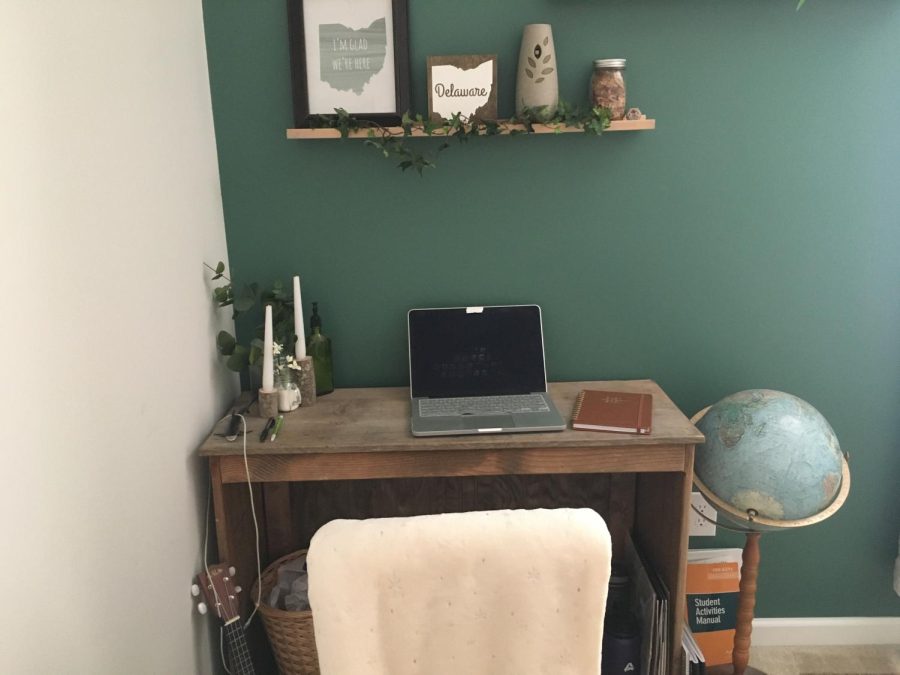Students taking online classes struggle with their home environment
Many students who were planning on living on campus have decided to live at home instead because of coronavirus, quarantining and online classes.
At home, students have to live outside of a learning environment and keep up with schoolwork while living with their families and continuing to deal with other responsibilities.
Anika Casanova, a junior political science major, decided to stay home this semester because of health concerns, the cost of room and board and fears about being sent home early.
“I would not be surprised if Kent closed again. It just felt like a lot of hassle to move in, pay room and board and then potentially move back out in a couple of months,” Casanova said. “I would love for us to be in a better situation, and the schools not have to close, but it just doesn’t look good. A lot of [students] are having to quarantine for multiple months at their universities and I think that was exactly what I was scared of and exactly why I stayed home.”
Likewise, Rachel Barrackman, a sophomore nursing major, decided that paying for room and board and a meal plan wasn’t worth the cost since she only has one in-person class this semester. She chose to live at home for free and commutes to campus once a week instead.
For a traditional student, school is a working environment and home is a place to relax. Now, some students go to school and relax in the same space. Having a routine at home helps Casanova wake up in the mornings, get ready for the day and destress. She gets up a few hours before class, does yoga and has coffee. She also goes on walks around her neighborhood and goes on short drives to get out of the house.
Barrackman, on the other hand, has a routine with responsibilities that she wouldn’t have if she lived on campus.
“I try to have a routine like I would have if I was at school. It’s a little bit tougher at home because when my mom’s at work I have to get up and let the dogs out and take care of the ducks and the chickens,” Barrackman said. “At school, you just get up and get ready for class and your whole day is school-oriented. At home, there are other things to be done, too.”
For many students, living at home also means living with more parental control and family conflicts.
“It’s weird because you’re an adult, but you’re living with people who are more adult,” Barrackman said. “At school, you can do whatever you want and there’s no one there to tell you ‘Hey, you can’t do that.’ At home, it’s a little more like being in high school again.”
For sophomore English major Katie Hudnell, living at home means having to update her family on what she is doing and having to plan her schedule around her family.
Hudnell stayed home this semester because she didn’t have any in-person classes. However, even if she did have a few, she thinks she would still live at home because there aren’t many in-person activities going on. She still hopes she can live on campus soon.
“I feel comfortable as long as everyone is doing their best to social distance and wear their masks properly,” Hudnell said. “I really hope I get to live on campus next year. That is definitely the goal right now, but if I don’t have any in-person classes next year, I’ll probably just stay home or transfer to the Stark campus.”
Although living at home is a cheaper and safer option, Casanova still misses the college experience.
“Not that it’s the end of the world, but I do think that’s a big formative time for people. So, not eloquently, but it sucks,” she said.
Living on campus is usually a rite of passage for many college students, but without many of the usual college activities, some students feel that they’re not missing anything by staying at home.
Barrackman said she misses her friends who live on campus, but she’s glad she chose to live at home since the dining halls are takeout only and there are no in-person events. She believes living on campus this semester would have been boring in comparison to her experience last year because there are more regulations and fewer activities.
“It’s not even that there’s that much going on,” Casanova said. “I think it’s just perceived as missing out sometimes.”
Megan Becker covers COVID-19. Contact her at [email protected].
SUPPORT STUDENT MEDIA
Hi, I’m Lauren Sasala, a senior journalism student from Toledo. I’m also the editor in chief of The Kent Stater and KentWired this semester. My staff and I are committed to bringing you the most important news about Kent State and the Kent community. We are full-time students and hard-working journalists. While we get support from the student media fee and earned revenue such as advertising, both of those continue to decline. Your generous gift of any amount will help enhance our student experience as we grow into working professionals. Please go here to donate.



